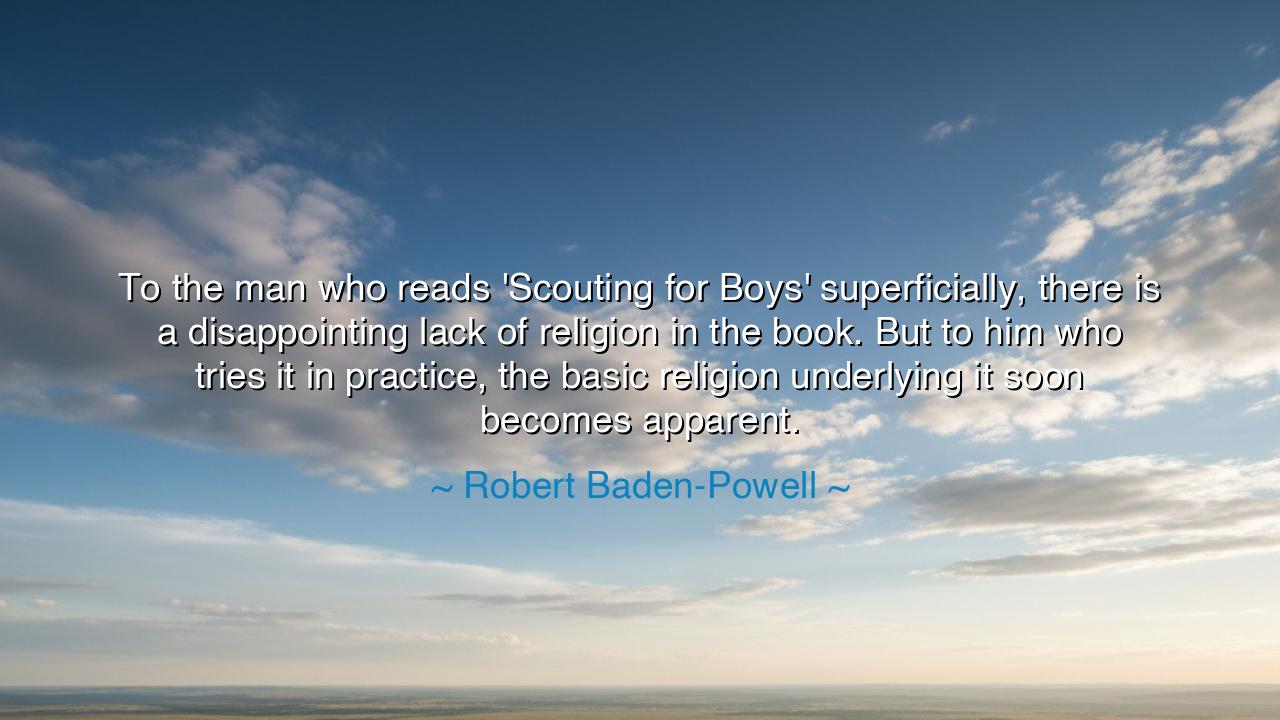
To the man who reads 'Scouting for Boys' superficially, there is
To the man who reads 'Scouting for Boys' superficially, there is a disappointing lack of religion in the book. But to him who tries it in practice, the basic religion underlying it soon becomes apparent.






Robert Baden-Powell, founder of the great Scouting movement, declared with conviction: “To the man who reads Scouting for Boys superficially, there is a disappointing lack of religion in the book. But to him who tries it in practice, the basic religion underlying it soon becomes apparent.” These words reveal a profound truth: that religion is not only in sermons and rituals, but in the very way a life is lived—in acts of service, in reverence for nature, in the quiet practice of duty, honor, and kindness. Baden-Powell reminds us that faith, when stripped of hollow words, becomes most visible in action.
The ancients, too, proclaimed this wisdom. Confucius taught that ritual without sincerity is an empty shell, but when lived with integrity, it becomes the harmony of heaven and earth. The prophets of Israel declared that God desired mercy more than sacrifice, justice more than burnt offerings. And Christ Himself said, “By their fruits you shall know them.” So too, Baden-Powell insisted that the religion of Scouting was not in the creeds written on the page, but in the spirit lived in the field—through brotherhood, humility, and respect for all creation.
Consider the story of a Scout troop in war-torn Europe during the Second World War. Amid chaos, young boys carried food to the elderly, guided refugees through forests, and risked themselves to show compassion to the suffering. They did not carry banners of dogma; they carried the spirit of service. To some, their handbook may have seemed lacking in religious instruction, yet in practice, their deeds were saturated with the highest faith: love of neighbor, sacrifice for others, and reverence for life. Their lives preached louder than any sermon.
Baden-Powell’s words caution us against judging by appearances. A superficial glance at Scouting for Boys may leave one searching for chapters on doctrine or explicit theology. But the founder’s vision was subtler, deeper: that in teaching young men to camp, to cooperate, to honor their word, to respect the world around them, they were being initiated into a lived religion of character. Faith was not to be mouthed—it was to be lived. Religion was not a compartment of life—it was the foundation of daily conduct.
And yet, O listener, there is also a challenge here. Many claim religion, yet live without it. They repeat creeds but neglect compassion; they bow in temples but show no mercy outside them. Baden-Powell turned this on its head: he wrote a book that to the casual reader seemed “secular,” yet in practice, it cultivated reverence, service, and duty—the true marks of the divine. Thus, he exposed the paradox: religion is not proven by words, but by practice.
The lesson is clear: if you seek God, look not only to books and speeches, but to the actions of those who serve faithfully. Do not dismiss a path because it lacks the labels you expect; instead, ask what fruits it bears in the world. If a teaching leads to kindness, courage, and brotherhood, it carries within it the heart of true faith. If it breeds arrogance, cruelty, or division, it is barren, no matter how pious its words.
Practical wisdom flows from this: live your faith. Do not be content to read it or to recite it. Practice it daily—in your work, in your family, in your dealings with strangers. Let your creed be written in deeds, not merely on paper. For, as Baden-Powell saw, when faith is embodied in action, its presence is unmistakable, even to those who never name it.
So remember, O children of tomorrow: the basic religion underlying life is revealed only in practice. Do not search for God in hollow words alone, but in the service of others, in reverence for the earth, in the courage of duty fulfilled. In these things, the divine becomes visible, and in living them, you yourself become a bearer of light.






AAdministratorAdministrator
Welcome, honored guests. Please leave a comment, we will respond soon